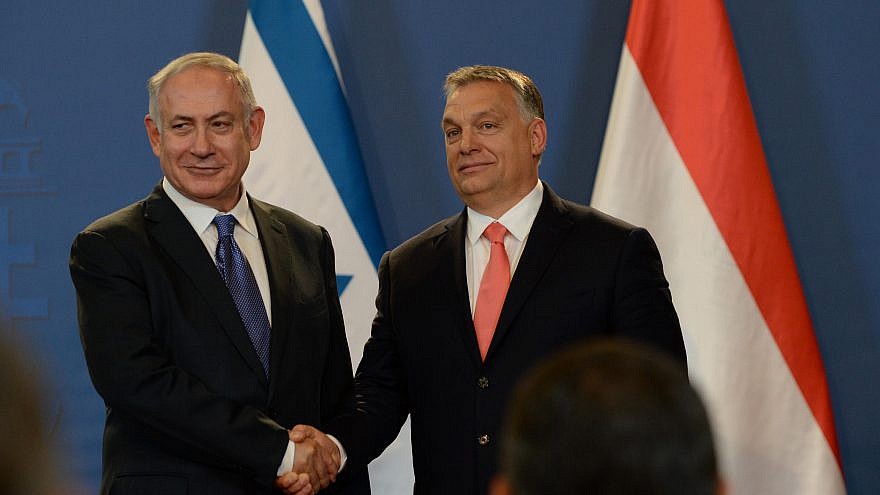For those who like neat political theories with straight lines connecting the people they don’t like, the upcoming visit of Hungarian President Viktor Orbán to Israel provides some potent ammunition. Orbán was elected for a third term in office this year but, just as is the case with Vladimir Putin’s Russia, no one should confuse Hungary with a democracy. He’s also been accused of spreading anti-Semitism.
That’s why Netanyahu’s critics view the welcome that Orbán will receive this week as linked to what they consider the prime minister’s efforts to undermine Israeli democracy. They also believe Netanyahu’s friendly attitude towards right wing nationalists was the reason why he approved a statement that allowed the Polish government to falsify some facts about the Holocaust. Furthermore, they think that his repeated visits to Russia and efforts to build some sort of relationship with Putin are in some way linked to the controversial statements and actions of his friend, U.S. President Donald Trump. In this way, those who don’t like both Netanyahu and Trump have built a narrative in which both can be depicted as edging towards fascism.
Connecting the dots between Trump, Netanyahu, Putin, Poland and Orbán seems logical to those searching for a unifying theory that can explain their enmity to the current leaders of both the United States and Israel. But the story that picture paints is a false one. It also misunderstands Israel’s strategic position and the nature of the job Netanyahu must do to lead a small, often embattled democracy in a sea of hostile countries.
Orbán is an unpleasant and dangerous character. He and his nationalist ruling party have effectively destroyed the democracy that emerged in Hungary after the collapse of the Soviet empire, and he has a complicated relationship with anti-Semitism. He has largely repressed overt expressions of Jew-hatred in Hungary and supported the local Jewish community. It is, according to most reports, much easier to be a Jew in public in Hungary than it is in, say, France or perhaps even Germany, where anti-Semitic attacks happen with greater frequency.
But Orbán has also exploited his nation’s longstanding acceptance of anti-Semitic rhetoric. While his re-election this year was no more in doubt than that of other autocrats who stage faux exercises in democracy, like Putin or Turkey’s Recep Tayyip Erdoğan, his pre-election rhetoric including vicious attacks employing standard anti-Semitic tropes when discussing Jewish financier George Soros. The billionaire is intensely disliked by many people in the West for good reasons due to his efforts to undermine Israel and advocacy for left-wing causes. But he has played a largely constructive role in Eastern Europe supporting democracy. The ugly attacks on him showed another side of Orbán that no one should forget.
The republics that emerged in Eastern Europe after the fall of the Berlin Wall have been fertile ground for authoritarian and nationalist movements. But most are also interested in good relations with Israel. Some of that has to do with the fact that they know it’s in their political and economic interests to re-engage with the Jewish world, even as the ruins of once thriving Jewish communities that perished in the Holocaust remain a standing rebuke to their history of anti-Semitic incitement. To reject the desire of nations like Hungary and Poland for close ties with Israel would be self-defeating.
There are also those who argue that Jews should make common cause with nationalist groups in Europe because of their hostility to Islamists. This is a delicate question because the influx of large numbers of immigrants from Muslim countries to be a major source of European anti-Semitism. Jews in Europe are often faced with a difficult dilemma. Do they defend immigrants who are under attack from nationalists, but also openly hostile to Jews? Or do they ally themselves with undemocratic forces that, unlike many European liberals, understand the threat that the rise of Islamism poses.
That’s a line Netanyahu doesn’t want to cross since getting too chummy with anti-Semites is something he knows the Jewish world won’t accept, no matter how dangerous the streets of Western European cities become for Jews. Yet the prime minister still has an obligation to enlist nations like Hungary to oppose efforts to isolate Israel, as well to maintain an open line of communication with a Russian regime that has effective military control of parts of neighboring Syria.
Netanyahu isn’t running a fan club for dictators. As he has done with his successful efforts at building bridges with Sunni Arab states like Saudi Arabia, he is expanding Israel’s network of friends at a time when that correlates into a diplomatic advantage and increased trade.
If Israel were to limit its diplomatic outreach to only healthy democracies and/or those nations led by admirable persons, it would be conducting the moral equivalent of a BDS campaign against itself. Netanyahu must be careful about what he says about ties with leaders like Orbán. But at a time when much of Africa and Southeast Asia, as well as the Muslim and Arab worlds, are still openly hostile to Zionism, the Jewish state can’t afford to be too picky when it comes to choosing its friends. Those who damn Netanyahu for doing his job or expect Israel is to rebuff Europeans who want to get closer are doing the work of the Jewish state’s enemies, not its friends.


























